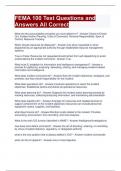FEMA 100 Test Questions and
Answers All Correct
What are the accountability principles you must adhere to? - Answer-Check-In/Check-
Out, Incident Action Planning, Unity of Command, Personal Responsibility, Span of
Control, Resource Tracking
When should resources be deployed? - Answer-only when requested or when
dispatched by an appropriate authority through established resource management
systems
True or False: Resources not requested should refrain from self-dispatching to avoid
overburdening the incident command - Answer-True
What must IC establish for Information and intelligence management? - Answer-a
process for gathering, analyzing, assessing, sharing, and managing incident-related
information and intelligence
What does incident command do? - Answer-Sets the incident objectives, strategies, and
priorities, and has overall responsibility for the incident.
What does operations do? - Answer-Conducts operations to reach the incident
objectives. Establishes tactics and directs all operational resources.
What does planning do? - Answer-Supports the incident action planning process by
tracking resources, collecting/analyzing information, and maintaining documentation
What does logistics do? - Answer-Arranges for resources and needed services to
support achievement of the incident objectives (resources can include personnel,
equipment, teams, supplies, and facilities).
what does finance do? - Answer-Monitors costs related to the incident. Provides
accounting, procurement, time recording, and cost analyses.
What is the sixth ICS function identified in NIMS? - Answer-Intelligence/Investigations
how does nims define command? - Answer-the act of directing, ordering, or controlling
by virtue of explicit statutory, regulatory, or delegated authority
what is the only position that is always staffed in ICS? - Answer-incident commander
what can the IC appoint? - Answer-one or more deputies
, what must the deputies be qualified to do? - Answer-to assume the Incident
Commander's position
what is the IC responsible for? - Answer-Ensuring overall incident safety, Providing
information services to internal and external stakeholders, such as disaster survivors,
agency executives, and senior officials, Establishing and maintaining liaisons with other
agencies participating in the incident
when should command be established? - Answer-at the beginning of the incident
true or false: The Incident Commander is responsible for all Incident Command System
(ICS) functional areas until the Incident Commander delegates a function - Answer-true
who are the command staff? - Answer-Public Information Officer, safety officer, Liaison
Officer
what does the public liason do? - Answer-interfaces with the public and media and/or
with other agencies with incident-related information requirements
what does the safety officer do? - Answer-monitors incident operations and advises the
Incident Commander on all matters relating to safety, including the health and safety of
incident management personnel
Common Terminology - Answer-Component of ICS, use standard terminology so every
agency understands what's going on
Modular Organization - Answer-The Incident Command System (ICS) organizational
structure develops in a modular fashion based on the incident's size and complexity.
The responsibility for the establishment and expansion of the ICS modular organization
rests with the Incident Commander.
As the incident grows more complex, the ICS organization may expand as functional
responsibilities are delegated.
Management by Objectives - Answer-The IC sets incident objectives that drive incident
operations
Which NIMS Management Characteristic includes documents that record and
communicate incident objectives, tactics, and assignments for operations and support?
- Answer-Incident Action Planning
What does an IAP need to be effective? - Answer-Cover a specified timeframe, Be
proactive, Specify the incident objectives, State the activities to be completed, Assign
responsibilities, Identify needed resources, Specify communication protocols




